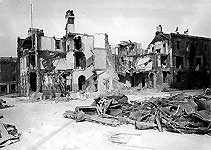| D Day or Wedding Day? Continued |
|
This is a story of June 6 1944, a significant day in history but 56 years ago I was barely 20 and it was supposed to be the start of our ship's leave. I was part of the crew of HM Drifter Reverbaration, a Lowestoft fishing vessel and during WW2 a minor warship stationed in Dover from 1939 to 1945. She was armed with a 3 pounder gun forward, a 20mm Orlekon gun mounted on the galley aft and Single and Twin Lewis Machine Guns around the deck. Aft were Depth Chargers and on the bridge PAC rockets.
At 0800 6th June 1944, the ship's company were to proceed on leave and one shipmate., David Guild was to be married to Eileen at 1600 in the Elms Vale Road Church. Dorothy, my wife of less than one year was due in Dover from London to be at the wedding,. I had obtained a pass for her to come to Dover and it should have been the start of a great leave.
 |
 |
|
 |
| |
| Photograph showing widespread shell damage at Dover |
|
Denis and Dorothy Colthorpe |
On the 5th June 1944 we had sailed to join a convoy on a simple escort duty to the west. On the 6th we were returning eastward and sometime in the afternoon we met a westbound convoy. It looked like goodbye leave and goodbye wedding.
This was a fast convoy and not the normal we were use to in Dover Strait. These were 10,000 tonners not the 1000 ton colliers we had escorted so often. We were ordered to lay smoke because "Fritz" was making things uncomfortable by shelling us from the cross channel guns at Cape Gris Nez. These guns were deployed in 4 batteries:
Lindemann Battery of three 16" Guns
Todt Battery of four 15" Guns Gross
Furfurst Battery of four 11" Guns
Railway Battery of four 11" Guns
During the action two ships were hit, one burned and finally beached between Dover & Folkstone. The second carried 300 soldiers, I think Royal Engineers but I can't be sure and these soldiers were soon in the water and small ships were about everywhere picking up survivors. How some of them were not run down by the large ships I will never know.
During this melee, HM Drifter Reverberation was hit in the side by a large lump of shrapnel. We were temporarily out of action, fortunately there were no casualties and we were ordered back to Dover. We pulled into the Eastern Basin by the sunken destroyer HMS Codrington. We were told we would be repaired and be ready for sea at 0700 the next morning. After securing the ship and getting the repair crews started we finally got away at 20:00, four hours late for David and Eileen's wedding.
That June England was on double summer time, so it didn't get dark until around midnight and "Jerry" was playing his shelling game. The game went like this, lob a shell into Dover Harbour, the siren would sound and if no shells landed for one hour then the all clear would sound. Ten minutes later another shell would be lobbed over and the process would start again.
There was no transport to town due to the shelling but luckily the Purity Laundry Van was on the dock and he was going back to the yard, right passed the Elms Vale Road Church. We all piled in and arrived at the church on a pile of dirty washing. The Vicar and his wife met us and told us to search the shelters at the back of Elms Vale Road. If we could find her and get her to the church then the wedding could go ahead.
Jumping fences, we searched the backyard shelters until we found Eileen, still in her wedding gown. We got her to the church and I guess they were married around 21:00. As I watched the service I had time to think about Dorothy, I had been able to ring Dover Priory Station and they told me that no trains had come into Dover, so I knew she would be out of range of the shelling and I assumed that she was still in London.
After the service, the reception was held at Eileen's home and the wedding breakfast was a grand do. Around 23:30 the Skipper instructed us to return to the ship and told David to be back onboard by 07:00.
June 7th 1944 we were back at sea, escorting and smoke laying for the channel convoys until the guns fell silent on 20th September 1944. A signal from Commander Boxhall was received praising everyone on this operation and that we had only lost 150,000 tons of shipping.
On 9th June 1944 I received a letter from Dorothy. She had left London on the morning of June 6th 1944, before the news had broken and traveled to the outskirts of Dover where the train had sheltered in the tunnel all day. When the shelling stopped she traveled back to London and hence missed the Wedding and any news of the landings at Normandy.
That was my D Day, perhaps not as historically significant as others but a very human story. Dorothy and I now live in Australia and have been married 57 years on 19th June 2000. We have two children, Carol and Peter and four grandchildren. Our son served in the Royal Australian Navy for 27 years and finished his career as a Engineer Lieutenant Commander.
To those who served in that war and since, Thank You All.
Denis Colthorpe 2000
|